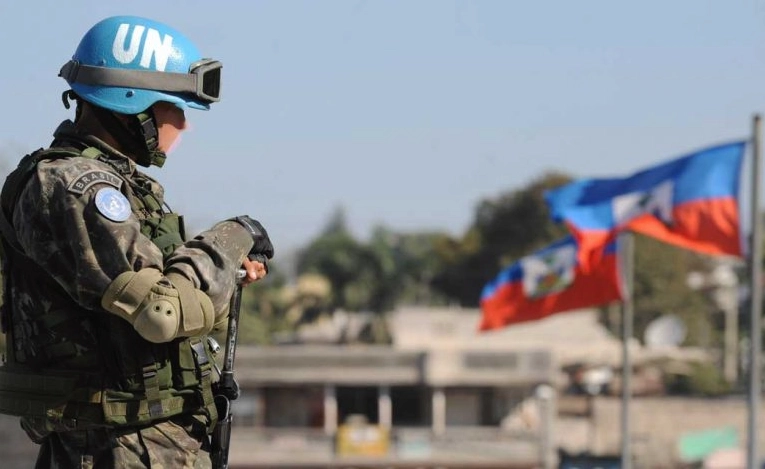The most recent appearance of Haiti in international headlines reinforces the idea of chaos and absolute disorder in a Caribbean country of most African descent population. This is due to the invasion of the Haitian National Penitentiary, in an attack attributed to the leadership of Barbecue, a former police officer of the Haitian National Police (HNP) and leader of the G9 an Fanmi and Alye Gang, the result of which was the release of more than 3,000 inmates.
Before adhering to the sensationalist and racist headlines of the international media, it is important to understand Haiti’s recent political history to which the international community has not yet been able to come up with any response: the magnicide of Jovenel Moïse on July 7, 2021, was a serious event. Since the assassination of John Kennedy on November 22, 1963, no sitting head of state has been assassinated in the Americas.
So far, public opinion is waiting for the masterminds of the crime to be revealed. Meanwhile, a completely illegitimate government led by Ariel Henry occupies power in Haiti under strong and uninterrupted popular protests. As is customary in Haitian politics, Henry remains unscathed and completely oblivious to the Haitian people’s absolute indignation at his role as political usurper for more than two consecutive years.
He has not made any appeals, he hasn’t presented a plan for the transition of government, he hasn’t resumed the electoral process that was underway when Jovenel Moïse was assassinated, and he has not done anything for the country. It was surprising when Resolution 2699 was passed in October 2023, when the Security Council authorized the deployment of Kenyan troops in the country to control gangs in the capital Port-au-Prince.
A decolonial and anti-racist reading
A decolonial and anti-racist reading of Haiti must be based on an in-depth analysis of the long-term effects of a United Nations Peace Mission in Black countries. Decolonizing and deracializing peace implies laying solid foundations for analyzing and reading the sensitive variables that destabilize a country.
One of the “successes” and perhaps the only goal achieved by MINUSTAH (United Nations Stabilization Mission in Haiti), from 2004 to 2017, led militarily by Brazil, was the recreation of the NHP — Haitian National Police. In that context, it was essential for the international community and the United Nations to build an aesthetic of a Policy that was supposed to work: uniforms, cars, weapons, gender equity, and human rights training.
However, this aesthetic quickly clashed with the structural conditions to which the police were subjected, with salaries late and working hungry, many approached motorists on the streets to pay them for a meal. Many worked hungry days. These conditions of extreme food insecurity and lack of salaries were of little interest to the international community, which believed that these problems either did not exist or could be self-managed.
From this profound structural crisis, an insurgent police movement called 509 Phantom emerged, claiming the right to military unionism through insubordination and armed violence, one of the most visible impacts of the post-MINUSTAH effects. After years of deteriorating working conditions for Haitian police officers, the “509 Phantom” group began protesting violently against government institutions in May 2020, while Jovenel Moïse was still in office.
The crisis deepened with the arrest of several leaders of the movement and the ban on police officers claiming their rights. The situation deteriorated rapidly in Delmas and Pétionville, with violent attacks on businesses and attempts to release political prisoners. The only international response to this crisis was for the American Embassy in Port-au-Prince to classify the 509 Phantom group as a terrorist organization. After this episode, Moïse’s government moved closer to Barbecue (Jimmy Chérizier) so that it could control the insurgent police, increasing the political and firepower of G9 Fanmi and Alye.
The rise of Barbecue’s political performance then began in Moïse’s government. At the time of the magnicide, Barbecue’s power structures were demobilized and then articulated with Martine Moïse, widow of Jovenel Moïse, survivor of the assassination attempt. From then on, gangs became widespread in the Haitian capital, not all commanded by Barbecue, who had been losing political power throughout 2023 and, in particular, with the possibility of a new UN Mission with Kenyan forces.
Barbecue’s attack on the prison was an extremely risky attempt to gain political support from released prisoners who were supposed to join Barbecue’s group in return for their freedom. Haiti is experiencing a permanent revolution whose mechanisms and triggers are present in almost all Latin American and Caribbean countries: a lack of social justice, food insecurity, a deficit of democracy, and exclusion from all basic rights.
Fighting racism and promoting decolonization implies a permanent struggle for existence and survival. In Haiti, these contradictions are wide open. Controlling all the armed groups (those under Barbecue’s leadership and those who are not) will require a great deal of political skill for the international community.
Unfortunately, in the case of Haiti, the images of chaos need to be produced and played out indefinitely for the spectacle of suffering and violence to reach the stereotypical levels of racism of the place that a Black country outside the African continent occupies in the imagination of the international community so that the gears of international aid can be turned. As the sense of emergency is artificially constructed, the “aid” will also be offered along colonialist and racist lines: without reading the context, without deepening the political debate and the power struggles that organize Haiti, and without democracy.
Haiti is one of the Latin American and Caribbean countries that produces the most intellectuals of remarkable genius, such as Jean Casimir, René Depestre, Edwidge Danticat, Sabine Manigat, Rosny Smarth, Raoul Peck, among many hundreds of intellectuals. Bringing them together to discuss possible solutions for the Haiti of the future would be the least the international community could offer.
*Translated by Janaína Ruviaro da Silva from the original in Portuguese.
Autor
PhD in Anthropology of Latin America and the Caribbean from the University of Brasilia. Director of the Maria Quitéria Institute and co-founder of the Brazil-Haiti Initiative. Post-doctoral studies at the State University of Haiti.











